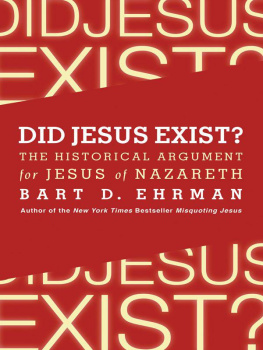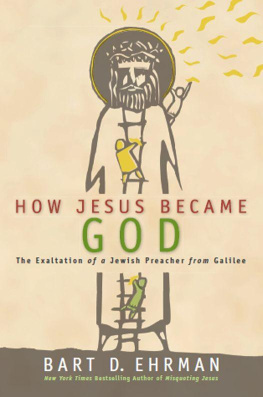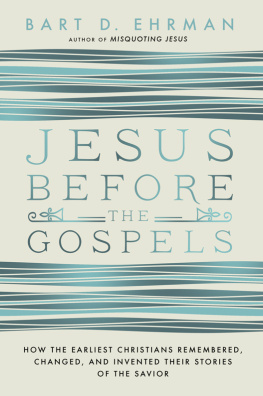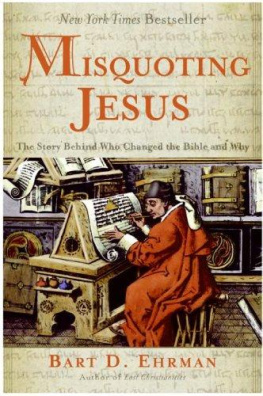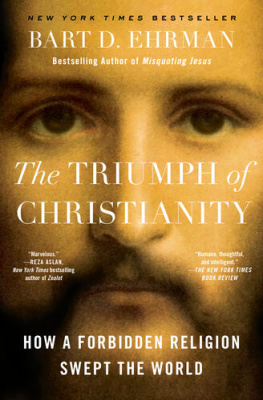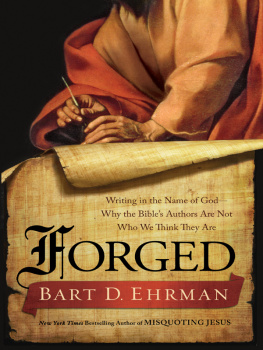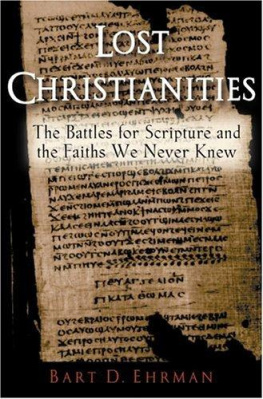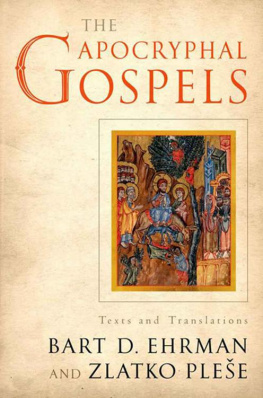The Orthodox Corruption of Scripture
The Orthodox Corruption
of Scripture
The Effect of Early
Christological Controversies on
the Text of the New Testament
BART D. EHRMAN

Oxford University Press
Oxford New York
Athens Auckland Bangkok Bombay
Calcutta Cape Town Dar es Salaam Delhi
Florence Hong Kong Istanbul Karachi
Kuala Lumpur Madras Madrid Melbourne
Mexico City Nairobi Paris Singapore
Taipei Tokyo Toronto
and associated companies
in Berlin Ibadan
Copyright 1993 by Bart D. Ehrman
First published in 1993 by Oxford University Press, Inc.
198 Madison Avenue, New York, New York 10016
First issued as an Oxford University Press paperback, 1996
Oxford is a registered trademark of Oxford University Press, Inc.
All rights reserved. No part of this publication may be reproduced,
stored in a retrieval system, or transmitted, in any form or by any means,
electronic, mechanical, photocopying, recording, or otherwise,
without the prior permission of Oxford University Press.
Translations of the New Testament and the Apostolic Fathers are the author's own. Translations
of the patristic writersincluding Justin, Irenaeus, Hippolytus, and Tertullianare from the
Ante-Nicene Fathers (eds. Alexander Roberts and James Donaldson; Edinburgh; T & T Clark
American Reprint Edition; Grand Rapids: Eerdmans, 1971), unless otherwise indicated. Quotations
from Eusebius are drawn from G. A. Williamson, Eusebius: The History of the Church
from Christ to Constantine (rev. and ed. Andrew Louth; London: Penguin, 1989). These various
translations have been occasionally modified in order to make them more inclusive.
The JBL style sheet has been used for all abbreviations.
Portions of the book incorporate material, slightly revised, from several of the author's earlier
articles, all used here with the permission of the publishers, gratefully acknowledged: 1 John 4.3
and the Orthodox Corruption of Scripture, ZNW 79 (1988) 221-43; The Cup, the Bread, and
the Salvific Effect of Jesus' Death in Luke-Acts, SBLSP (1991) 576-91; The Text of Mark in
the Hands of the Orthodox, Biblical Hermeneutics in Historical Perspective (eds. Mark Burrows
and Paul Rorem; Philadelphia: Fortress, 1991) 19-31, found also in LQ 5 (1991) 14356.
Library of Congress Cataloging-in-Publication Data
Ehrman, Bart D.
The Orthodox corruption of scripture: the effect of early
Christological controversies on the text of the New Testament
Bart D. Ehrman.
p. cm. Includes bibliographical references and index.
ISBN-13 978-0-19-510279-6 (Pbk.)
1. Bible. N.T.Criticism, Textual. 2. Jesus ChristHistory of
doctrinesEarly church, ca. 30-600. 3. Heresies, Christian
HistoryEarly church, ca. 30-600. I. Title.
BS2325.E47 1993 22506dc20 92-28607
15 17 19 18 16
Printed in the United States of America
on acid-free paper
Richard L. Ehrman
in memoriam
Acknowledgments
My personal and institutional debts have grown dramatically with the writing of this work, and here I would like to make a grateful, if partial, acknowledgment. The University of North Carolina at Chapel Hill has been supportive on all levels: the Faculty Research Council generously provided funding through a Faculty Development Grant in 1989, and the Institute for Arts and Humanities, under the direction of Ruel Tyson, awarded me faculty fellowships for the summer of 1989 and the spring of 1992, easing my teaching burden and providing a forum for intellectual discourse with scholars in other fieldsa surprisingly rare treat in modern academia. I am also obliged to my graduate research assistants, C. W. Thompson and Kim Haines Eitzen, who proved assiduous in gathering, checking, and evaluating bibliographical items, and, above all, to my colleagues in the Department of Religious Studies, who have tendered their moral and material support every step along the way.
I am especially grateful to my wife, Cindy, whose understanding and good humor grew with the length of the manuscript, and to my daughter, Kelly, and son, Derek, whose capacity for fun and zest for life have always provided a healthy antidote for the long hours that Dad was shut up in his study or lost on another planet.
I would like to extend my special thanks to friends and teachers who have read parts of the manuscript: my two perspicacious colleagues, Peter Kaufman and Laurie Maffly-Kipp, extraordinary for their recognition of inelegance; Elizabeth Clark and Bruce Metzger, whose seasoned judgments have always been graciously extended and gratefully received; and especially Joel Marcus, now of the University of Glasgow, and Dale Martin, of Duke, two exceptional New Testament scholars with mighty red pens, who carefully pored over every word of the manuscript, saving me from numerous egregious errors and infelicities of expression. Those that remain can be chalked up to my willful disposition in refusing (in good heretical fashion) to take their sage advice.
I have dedicated this work to the memory of my father, who did not live to see the completion of the project, but whose intangible presence can be felt throughout. Above all, he taught me that hard work can be rewarding, that humor always has a place, and that some convictions are worthy of a good fight.
Chapel Hill, North Carolina | B.D.E. |
February 1993 |
Contents
Introduction
This is a book about texts and their transmission, about the words of the emerging New Testament and how they came to be changed by scribes of the early Christian centuries. My thesis can be stated simply: scribes occasionally altered the words of their sacred texts to make them more patently orthodox and to prevent their misuse by Christians who espoused aberrant views.
Textual critics are commonly chargednot always unfairly and often from among their own rankswith disregarding research done in other fields. Narrowly focusing on the manuscripts of the New Testament, they often neglect the realia of ecclesiastical and social history that can elucidate features of the text. And restricting their theoretical field of vision to methods espoused by philology and Biblical higher criticism, they bypass important foundational questions, such as what it might mean to refer to the corruption of a text that is offhandedly called the original.
If these charges are leveled against the present study, it will have failed in one of its principal designs. To some extent, the study is meant to dispel the notion that New Testament textual criticism is at best an arcane, if rudimentarily necessary, discipline, of little interest to the enterprises of exegesis, the history of theology, and the social history of early Christianitylet alone to broader interests of scholars in the humanities, such as the history of late antiquity, the use of literature in religious polemics, and the construal of texts.
To be sure, the explicit goal of the study is itself traditional. I am interested in seeing how scribes modified the words of Scripture they inherited. The methods I use to attain this goal are also traditional: they are the critical procedures customarily used to establish any text, classical or biblical. But I am less concerned with interpreting the words of the New Testament as they came from the pens of its authors than with seeing how these words came to be altered in the course of their transcription. Moreover, my understanding of this process of transmission, that is, the way I conceptualize scribal alterations of a text, derives less from traditional categories of philology than from recent developments in the field of literary theory.
Next page

